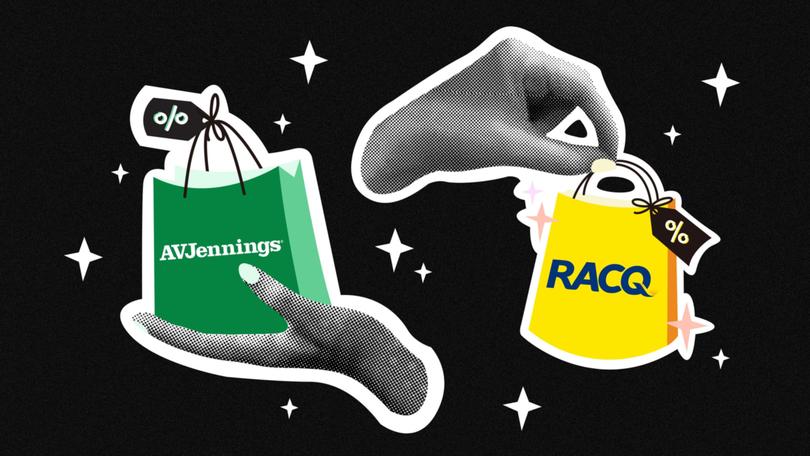Why AV Jennings’ sale to US private equity firm Proprium Capital is a good sign for investors and homeowners
The momentum around Black Friday sales is exciting corporate Australia, and it’s just one of a number of signs of early optimism heading into 2025.

Black Friday sales momentum is exciting corporate Australia with household names getting snapped up.
It’s a sign that optimism is creeping back into the investment community about the strength of the consumer sector heading into next year, and suggests that some of the challenges facing incumbent firms are turning into opportunities.
Australia’s housing sector has been one of the areas where business has been particularly tough. Last financial year nearly 3000 construction companies went into insolvency, hit by skilled labour shortages and rising raw material costs at one end, while trapped in fixed-price contracts on the customer side.
Sign up to The Nightly's newsletters.
Get the first look at the digital newspaper, curated daily stories and breaking headlines delivered to your inbox.
By continuing you agree to our Terms and Privacy Policy.After nearly 100 years building homes for Australians, homebuilder AV Jennings looks like being gobbled up by US private equity firm Proprium Capital.
AV Jennings, run by former Wallaby Phil Kearns, is sitting on a pipeline of nearly 10,000 lots across NSW, Queensland, Victoria, South Australia and New Zealand. That puts it in the lower-mid tier range in terms of the developer market, well behind the largest player Stockland with more than 80,000 development sites.
AV Jennings was just getting over the COVID/Ukraine hangover of costs and was hoping for an interest rate to juice sales. The Reserve Bank refuses to play dice and as a result sales have been slow, down 25 per cent compared to the previous year.
But with Federal and State governments targeting 1.2 million more homes over the next five years, the Proprium sees significant upside. The $374 million offer for AV Jennings is double yesterday’s closing share price and has the approval of the board. It would more than double the size of Proprium’s existing footprint in Australia where its subsidiary Avid Property has 6000-odd lots.
It’s a bet that the sclerotic pipeline of dwelling construction might finally be clearing.
Data from the Australian Bureau of Statistics yesterday showed housing construction has hit a three-year high. Housing inflation is also moderating, the ABS showed yesterday, with new dwelling purchases growing at a more moderate 4.2 per cent. Two years ago new dwelling inflation was running at 20 per cent.
The bet makes sense. Despite forecasts for a rate cut being pushed out, most economists think relief will come mid-year. The government has passed a bill to reduce the deposit requirement for first homebuyers. Building materials supply chains are healing, and construction worker wage inflation is moderating. Additionally, despite border restrictions, immigration will remain strong.
Private equity guys like to think of themselves as the smartest guys in the room: for Australia’s housing affordability fiasco, let’s hope their thesis is right.
Battle of the auto clubs
In a pretty unhappy year for AV Jennings, one of the bright spots was the Southeast Queensland market. With rapid population growth – primarily from fleeing Victorians – Queensland has become the place to be. ANZ’s chief executive Shayne Elliot said as much earlier this month when celebrating the integration of Suncorp Bank.
IAG, Australia’s largest listed insurer, wants in on the action, announcing it will acquire the insurance arm of the Royal Automobile Club of Queensland, giving it rights to the east cost motoring trifecta that also includes NRMA and RACV. RACQ will maintain its local brand.
With the deal, IAG will add another 1.7 million home and motor insurance customers boosting the revenue by $1.3 billion and taking it head to head with the country’s other significant insurer of homes and vehicles Queensland-based Suncorp. Even before this deal, the pair account for more than half of the market across both lines, although their share has dropped as challenger brands enter.
Macquarie Research has described home and motor as “two of the most profitable insurance products in the Australian market” and found that preventing customer churn is a core way to protect revenue. Auto Clubs (like RACQ) had been steadily growing for seven consecutive years, Macquarie said, so this deal not just gives IAG an expanded footprint in a fast growing, but takes out a key competitor as well.
The Australian Consumer and Competition Commission should look hard at this one given they have been given a nudge to get cost of living down, and insurance is one of the areas where prices have remained particularly sticky.
The market seems pretty confident the deal will get the green light from the ACCC, pushing up IAG shares by almost 5 per cent on Thursday to a near record. The deal is going to be positive for earnings in year one, and bolting the insurance arm onto IAG’s platform will lead to cost savings, aka “synergies”.
Insurers had gone through a period where profitability was dented by supply chain issues affecting motor vehicle parts and building supplies, while skill shortages pushed up wages for mechanics and construction workers and created bottlenecks that stalled claims.
Like the AV Jennings acquisition, this deal represents a bet on a more optimistic future for the country—one where lower interest rates and falling costs could help stimulate new home and car sales.

